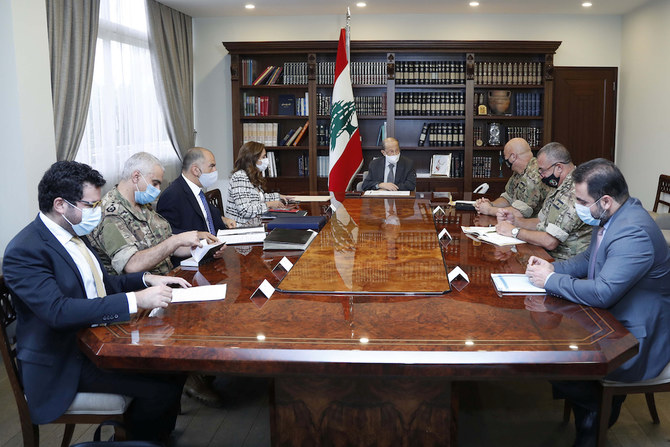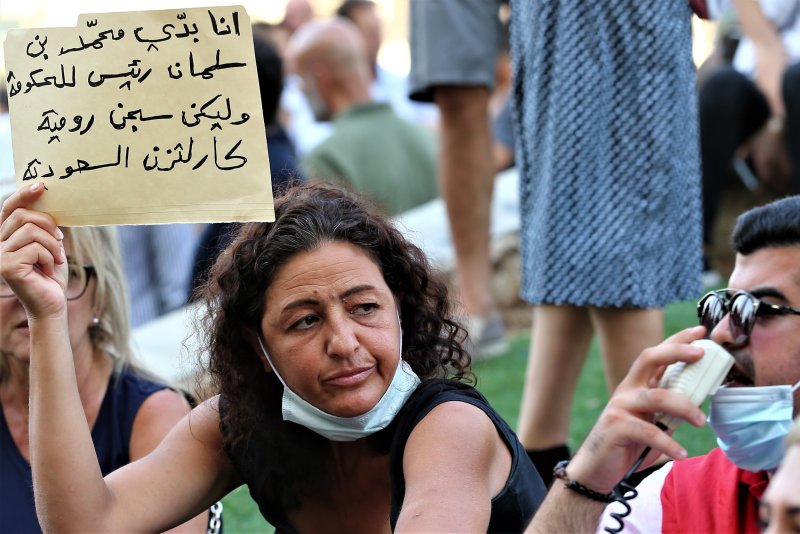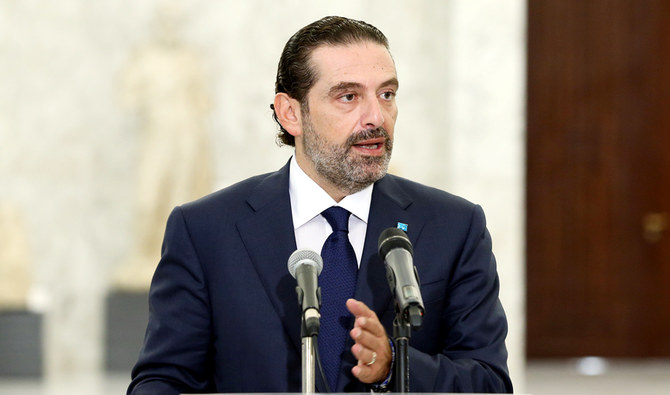
by naharnet.com -- The Presidency’s press office on Tuesday noted that claims that President Michel Aoun has violated the Constitution “weaken the Lebanese position” in the border demarcation negotiations with Israel. “To date, the President has not signed or ratified any international treaty in order to agree on it with the Premier,” the office said in a statement. “Any other remarks distort the Constitution and are aimed at either misinformation or, what’s worse, weakening the Lebanese stance at the wrong moment, seeing as Lebanon is going to practical and technical negotiations over the demarcation of its maritime border to preserve its natural resources and sovereignty over every inch of its land and waters,” the office said. It added: “Enough with polemics in the era of seriousness and we direly need solidarity and national cohesion for the sake of preserving or recapturing our sovereign rights.” The Premiership had said Monday that Aoun had made a “clear and blatant violation of a constitutional text” by not coordinating with caretaker PM Hassan Diab in the formation of the team that will handle the negotiations.
BEIRUT: After decades of conflict, Lebanon and Israel are set for the first round of talks over their maritime border that runs through potentially oil- and gas-rich Mediterranean waters. The US-mediated meeting between officials from both sides will be held at the headquarters of the UN Interim Force in Lebanon (UNIFIL) on Wednesday. This will be followed by talks on demarcating the land border. David Schenker, US undersecretary of state for Near Eastern affairs, will preside over the inaugural session of the maritime talks, according to the State Department. Beirut insists that these talks “have nothing to do with normalization” of ties with Israel. The four-member Lebanese delegation headed by air force Brig. Gen. Bassam Yassin. The three other members are navy Col. Mazen Basbous, Lebanese oil official Wissam Chbat and border expert Najib Massihi. Israel’s Energy Minister Yuval Steinitz will lead the Israeli delegation, according to Israeli officials.
Bassil Slams Hariri's 'Bravados', Proposes Constitutional Amendment

BEIRUT, Lebanon, (UPI) - ByDalal Saoud -- - With no new government in sight to adopt reforms that would release urgently needed international aid, poverty is growing in Lebanon, with a pervasive fear that it's going to get worse. The streets are increasingly filled with beggars, mostly Syrian refugees. The minimum monthly wage has fallen to 600,000 Lebanese lira, the equivalent of $400 just a year ago, currently worth $69 at the black market rate. In August, the United Nations Economic and Social Commission for Western Asia estimated Lebanon's poverty rate had surged to 55 percent in May, compared to 28 percent last year. Bader Jamal el Naboulsi, a construction worker from the Bab al-Tabbaneh neighborhood in Tripoli, has been jobless for months. "Now, I just do anything like cleaning homes and carpets or [work] as porter to raise at the end of the day 25,000 LL," which equates to $16 at the official rate and less than $3 at the black market rate, Naboulsi, a father of eight, told UPI. "Some days we sleep without food. I never beg for anything."
But his wife, Rima, is obliged to ask her neighbors for "bread, potatoes or anything they can spare" to feed her children. "I need at least 50,000 LL just to put some food on the table for my children." What the Lebanese people fear most is that the central bank will not be able to maintain the subsidy over basic commodities. What is left of its U.S. dollar reserves, estimated at $1.8 billion, barely allows it to continue subsidizing wheat, fuel and medicine at the official exchange rate of 1,507 Lebanese pound for $1, compared to LL 3,900 per U.S. dollar traded at the banks and nearly LL 8,700 in the black market. ADVERTISEMENT RELATED Lebanon's acting prime minister resigns, endangering reform Already drivers are seen queuing up at the gas stations to fill their tanks while many are touring the pharmacies to get medications that are in short supply.

by NAJIA HOUSSARI -- arabnews.com -- BEIRUT: Former Lebanese prime minister Saad Hariri has put himself forward as a potential leader in a bid to break the country’s growing political deadlock. He also began political consultations with other parties in order to revive the possibility of a successful French rescue plan on Monday. After a meeting with President Michel Aoun in the Presidential Palace, Hariri said: “We have no time to waste on political polemics. If someone wants to change the concept of the French initiative, let them bear the responsibility.” The French plan, launched by President Emmanuel Macron on Sept. 1 to help Lebanon cope with its crises, failed after Hezbollah and the Amal Movement demanded ownership of the finance portfolio and the presence of Shiite ministers in a new government. Hariri said that the government should be “formed of specialists who do not belong to parties and who will undertake specific reforms within a specific timetable, which does not exceed a few months.”
Lebanon is scheduled to begin negotiations with Israel on Wednesday to demarcate maritime borders amid an absence of government in the country, which is enduring one of its worst economic and financial crises to date. President Aoun said he “wants to form a new government as soon as possible, because the situation no longer tolerates further deterioration.” Aoun also urged “the necessity of adhering to the French initiative.” In a statement, Hariri said the consultations, which also included meetings with Parliament Speaker Nabih Berri and other former prime ministers, were designed to “float Macron’s initiative.” He added that the French plan “is the only and last opportunity to stop the collapse and rebuild what was destroyed by the Beirut Port explosion.”

by middleeastmonitor.com -- A British-Lebanese man has cycled 4,200 kilometres from London to Beirut to raise money to support victims of the devastating blast that rocked the capital city. Nearly 200 people were killed and 300,000 were left homeless after the 4 August explosion which could be felt as far away as Cyprus. Horrified at images from the scene, 38-year-old Eddie El-Lamaa felt compelled to do something to help. The father of three, who moved to the UK from Lebanon with his parents in 1985, embarked on the challenge to cycle to Lebanon, a journey he completed in 40 days. “It was like a mammoth of a task. Even professional cyclists were saying ‘look don’t do it.’ Even speaking to the people at the bike shop were looking at me like I was mad.” El-Lamaa didn’t own a road bike prior to the challenge and had not cycled since he was a teen. However, he successfully pedalled 4,200 kilometres through nine countries in Europe including France, Belgium, the Netherlands, Germany, Austria, Hungary, Serbia, Bulgaria and Turkey, before taking a ferry to Tripoli, Lebanon, and reaching his final destination. “I didn’t know how long it would take, how many miles it was. I didn’t even own a road bike at the time. I’m not a professional cyclist.”
Khazen History


Historical Feature:
Churches and Monasteries of the Khazen family

St. Anthony of Padua Church in Ballouneh
Mar Abda Church in Bakaatit Kanaan
Saint Michael Church in Bkaatouta
Saint Therese Church in Qolayaat
Saint Simeon Stylites (مار سمعان العامودي) Church In Ajaltoun
Virgin Mary Church (سيدة المعونات) in Sheilé
Assumption of Mary Church in Ballouneh
1 - The sword of the Maronite Prince
2 - LES KHAZEN CONSULS DE FRANCE
3 - LES MARONITES & LES KHAZEN
4 - LES MAAN & LES KHAZEN
5 - ORIGINE DE LA FAMILLE
Population Movements to Keserwan - The Khazens and The Maans
ما جاء عن الثورة في المقاطعة الكسروانية
ثورة أهالي كسروان على المشايخ الخوازنة وأسبابها
Origins of the "Prince of Maronite" Title
Growing diversity: the Khazin sheiks and the clergy in the first decades of the 18th century
Historical Members:
Barbar Beik El Khazen [English]
Patriach Toubia Kaiss El Khazen(Biography & Life Part1 Part2) (Arabic)
Patriach Youssef Dargham El Khazen (Cont'd)
Cheikh Bishara Jafal El Khazen
Patriarch Youssef Raji El Khazen
The Martyrs Cheikh Philippe & Cheikh Farid El Khazen
Cheikh Nawfal El Khazen (Consul De France)
Cheikh Hossun El Khazen (Consul De France)
Cheikh Abou-Nawfal El Khazen (Consul De France)
Cheikh Francis Abee Nader & his son Yousef
Cheikh Abou-Kanso El Khazen (Consul De France)
Cheikh Abou Nader El Khazen
Cheikh Chafic El Khazen
Cheikh Keserwan El Khazen
Cheikh Serhal El Khazen [English]
Cheikh Rafiq El Khazen [English]
Cheikh Hanna El Khazen
Cheikha Arzi El Khazen
Marie El Khazen